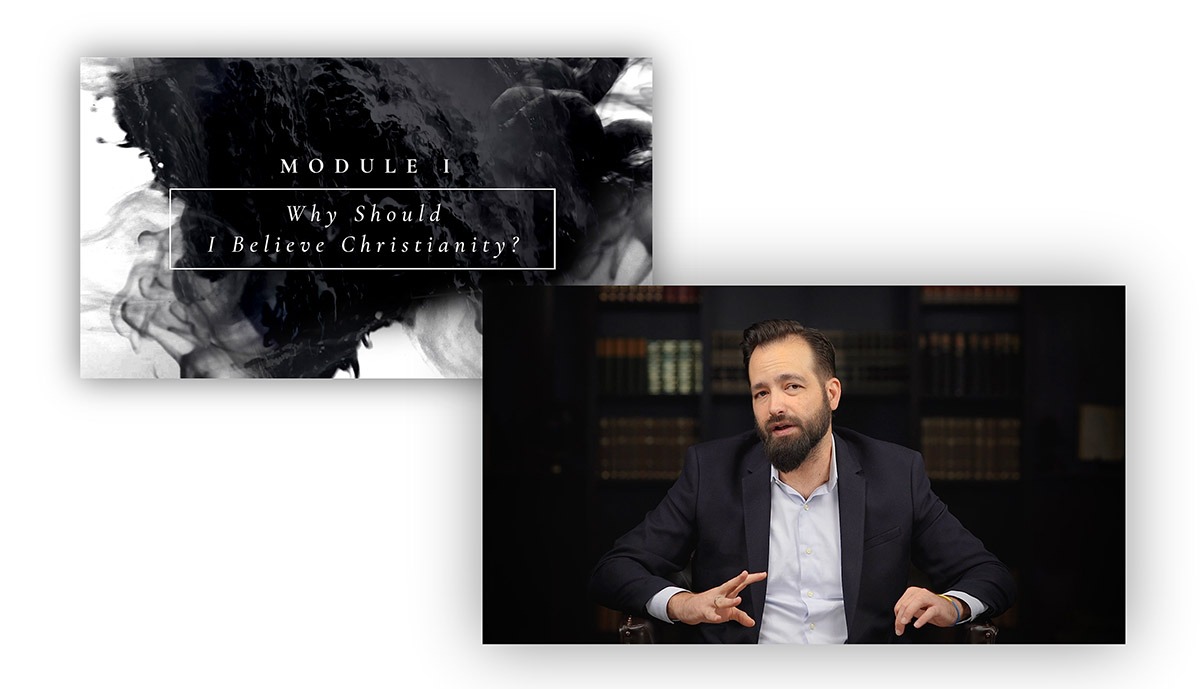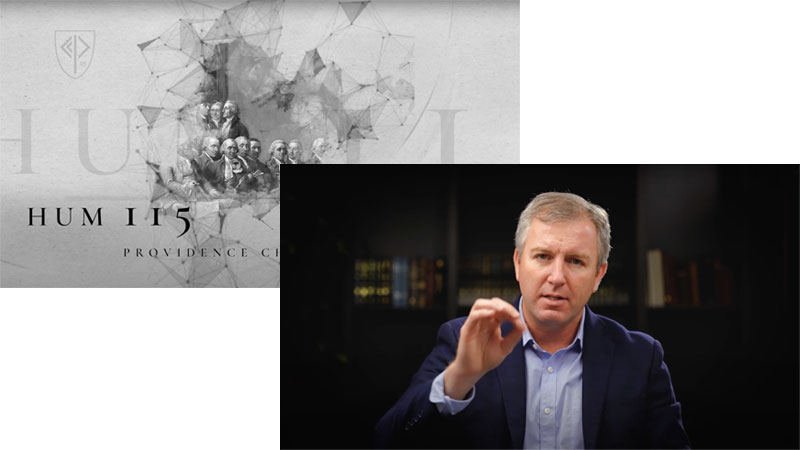Jesus’ cry of dereliction from the cross, “My God, my God, why have you forsaken me?” is recorded for us in the Gospels of Matthew and Mark (Matthew 27:46 and Mark 15:34). The words convey the profound mystery that the eternal Son, now also Son of Man, experienced separation from his heavenly father as He bore the full weight of the Father’s righteous wrath against all our sin (2 Cor 5:21). We cannot fathom the anguish and pain of this forsakenness that our Savior bore in His love for us, nor the anguish and pain of the Father’s giving up His one and only Son (Jn. 3.16).
Yet, what are we to make of the question in this cry? “Why…?” Must we think that Christ, in order to bear our sin and taste its wages, had to succumb finally to despair and doubt? Many interpreters think so, suggesting that for our Savior at this dark moment—and so for us beholding the cross—there was little if any hope. It was as if it had all gone horribly wrong, and nothing any longer made any sense, and we must sorrowfully accept this defeat of death as the awful cost of our redemption. And so we might feel our only consolation on Good Friday is knowing now with hindsight the glorious outcome of resurrection Sunday, and we can’t wait to get there!
However, the consistent testimony of the Scriptures is that Jesus knew full well why He had come—to give His life a ransom payment for sinners (Mk. 10.45)—and never wavered in His commitment to this mission in obedience to the One who sent Him. Even in Gethsemane, in the deepest sorrow, He prayed to the Father, “not as I will, but as You will” (Mt. 26.39). And anticipating the cross at the end of His public ministry, He said, “Now is My soul troubled. And what shall I say? Father, save Me from this hour? But for this purpose I have come to this hour” (Jn. 12.27). The author of Hebrews tells us that Jesus’ prayers were “with loud cries and tears to Him who was able to save Him from death, and He was heard because of His reverence” (Heb. 5.7). That deliverance He looked for was not from dying, but through death; that was the whole point. He is “the Founder and Perfecter of our faith, who for the joy that was set before Him endured the cross, despising the shame” (Heb. 12.2).
How then can we see this endurance and faith in that cry from the cross? In recognizing it not merely as a spontaneous cry of anguish, but as a deliberate quotation of Psalm 22. In both Matthew and Mark, the context has several other references to this psalm, such as the soldiers dividing His garments (Ps. 22.18), and the mocking of passersby taunting Him to save Himself (Ps. 22.8). The drama of the psalm was playing out around Him. Jesus surely knew this, as He knew all the Scriptures, and said repeatedly that He mustaccomplish His work because the Scriptures must be fulfilled. Therefore, we are not to take His reference to the first verse of the psalm in isolation from the rest of the psalm. The Gospel writers would also expect us to understand that, all the more that these are the only words of Jesus from the cross recorded by Matthew and Mark (there are six other sayings given to us in Luke and John), and especially given Matthew’s emphasis on Jesus fulfillment of the Old Testament Scriptures. We also know from throughout the New Testament, when its authors refer to a verse or passage from the Scriptures, they expect us to know its surrounding context. It was even a common practice of the Rabbis to point their hearers to a whole chapter or passage by citing just the first verse.
The first verse of Ps. 22 is this cry of abandonment. But three verses later we read, “In You our fathers trusted; they trusted and You delivered them. To You they cried and were rescued; in You they trusted and were not put to shame” (22.4-5). Then, after the psalm recounts the many afflictions of the sufferer, lament turns to praise starting in vs. 21. Vs. 22 has “I will tell of Your name to my brothers; in the midst of the congregation I will praise You,” which Heb. 2.12 cites as a declaration of Christ. The psalm goes on to celebrate a deliverance that will mean blessings for “all the ends of the earth,” and even life from the dead (22.27-29). Jesus knew this, and Jesus knew that though David had written this psalm, David was a prophet who wrote about more than his own experience. David understood that God had promised to set one of his descendents on his throne who would conquer death and reign eternally (Acts 2.30-31). And David understood that somehow his own suffering pointed forward to the way his greater Son would accomplish that.
But David’s own affliction and his own forsakenness that he felt (in 22.1 and his many other lament psalms) could only be a type (a picture or foreshadowing) of the coming Messiah. When Jesus uttered those words as the Lamb of God Who takes away the sins of the world, He was expressing, as Bavinck says, “objective God-forsakenness”; it was not just His feeling of anguish, but “He had in fact been forsaken by God” (Reformed Dogmatics, Vol. 3, 389). As Calvin said, not that the Father was actually angry toward His beloved Son, but He placed our sin and its punishment on Him for our sakes (Institutes2.16.11). And Jesus knowingly and willingly took this upon Himself. He knew He was the Servant of Isaiah 53 Who would bear our grief and carry our sorrows (Is. 53.4). He was “like a Lamb that is led to the slaughter” (53.7), the key difference being, He bore it voluntarily. And thus He also knew that when He made Himself a guilt offering, He would see His offspring and prolong His days, and make the many to be accounted righteous (53.10-11). It would also be the long awaited crushing of the serpent’s head (Gen. 3.15), which Jesus also knew: “Now is the judgment of this world; now will the ruler of this world be cast out. And I when I am lifted up from the earth, will draw all people to Myself” (Jn. 12.31-32).
Thus, when Jesus uttered this cry—in all its pain and sorrow—it was far from being a cry of utter despair. It was, in fact, the pinnacle of His accomplishment, just as had been planned for Him (and for us, from before the foundation of the world), and just as He had undertaken to do from eternity, and during all His earthly ministry. And He did it there on the cross, bearing away all our sins forever, winning for us righteousness and an eternal inheritance, and the certainty that we would never and could never be forsaken by God.
In the Gospels, immediately after Jesus’ quotation from Ps. 22.1, someone tries to give Him sour wine to drink, and right after that “Jesus cried out again with a loud voice and yielded up His spirit” (Mt. 27.50; Mk. 15.37). Many have noted that this is most likely a loud shout of exultation, a proclamation of victory, as immediately the curtain of the Temple was torn in two, and in Mark, the Gentile centurion said upon hearing Jesus’ last cry, “Truly this Man was the Son of God!” (Mk. 15.38-39). What He shouted so triumphantly, not recorded by Matthew and Mark, would have been what John tells us: “When Jesus had received the sour wine, He said, ‘It is finished,’ and He bowed His head and gave up His spirit” (Jn. 19.30). This famous expression, “It is done,” or “completed,” or “accomplished,” rendered to us by John in the Greek perfect tense, carries the sense of once for all accomplishment, with continuing effects in the present. We do not know what exact words would have been uttered by Jesus in Aramaic (or Hebrew), but it is likely that He was in fact alluding to the last verses of Psalm 22: “A seed (offspring) will serve Him; it shall be told of the Lord to the last generation; they shall come and proclaim His righteousness to a people yet unborn, that He has done it” (22.30-31). From the beginning to the end, Jesus wanted us to know, He lived out Psalm 22, and “the will of the Lord will prosper in His hand” (Is. 53.10). He did it! The righteous One, our Savior and Lord Jesus Christ has done it! We shout it too, in awe and joy, and with confidence that nothing will hinder the rest of His people, His sheep, from hearing His voice, and coming to Him as the now risen and reigning Lord, and bowing in worship. It truly is a good Friday!






